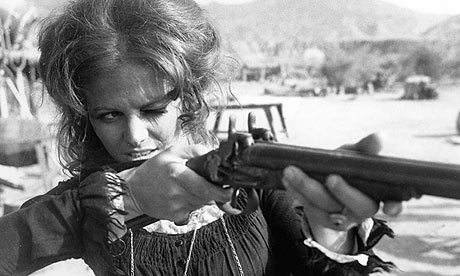A good example of this is shown in the beginning scenes when we see an early shoot-out between four cowboys at an almost deserted train station. This is supposed to the end of the movie, the climax! None-the-less, the movie truly is "electric in dramatic detail" as the New York Times describes and I would agree and say further that it kept my interest because this movie challenged my ideological expectations. As a genre movie, Once Upon a Time in the West has the ability to challenge ideology, our idea of what seems normal, and flip it upside-down.
Right from the beginning, it is very difficult to tell who is the hero and who is the villain. Every cowboy seems to be the "bad guy." Even Henry Fonda, who is known for his "good guy" image on the screen turns to the dark side when we see him shoot a boy at point blank-range. Another example of how Leone challenges dominant ideology in this movie is when he portrays the lonely widow as a prostitute. You don't know if you are supposed to feel sorry for her or to feel disgusted in her presence. Also, her interaction with Cheyenne is very different from what one would expect. She openly accepts the idea of being raped, knowing that it has happened before to her as a prostitute, and does not act the way a lady is "supposed to act during those times in the presence of a man. Cheyenne is also surprising in regards to his actions in return, again challenging our ideologic roles. Seemingly the bad guy, he comes off as a somewhat sensitive man towards Jill, the widowed prostitute.

As a genre movie, Once Upon a Time in the West has the ability to challenge ideology, our idea of what seems normal, and flip it upside-down. Leone pushes against what is "normal," not only within the western genre, but also heroic roles and gender roles because he knew his audience would come in with certain expectations about the genre. I think this was a riveting movie that kept me on the edge of my seat, and forced me to question the idea of realism and ideology. Although the New York times viewed this movie as "the most absurd," I believe that it was absurd in all the right ways.

 Shock. Disgust. Outrage. Disbelief. These were the words that kept replaying in my head after seeing "Panama Deception." Director Barbra Trent uses both her ideology and camera techniques such as juxtaposition to provoke extreme emotions within the audience and shows how skewed American media really is.
Shock. Disgust. Outrage. Disbelief. These were the words that kept replaying in my head after seeing "Panama Deception." Director Barbra Trent uses both her ideology and camera techniques such as juxtaposition to provoke extreme emotions within the audience and shows how skewed American media really is.
